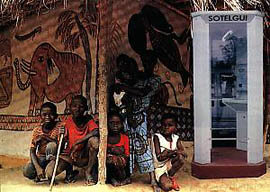 TELECOMMUNICATIONS TELECOMMUNICATIONS
 TELECOMMUNICATIONS ATTRACT MALAYSIAN INVESTORS TELECOMMUNICATIONS ATTRACT MALAYSIAN INVESTORS

The poor state of the telecommunications sector was, in view of potential investors, one of the main deterrents for the establishment of foreign companies in Guinea. The 1992 telecommunications liberalization policy allowed for private investment. Then the old PTT (Ministre des Postes et des Telecomunications), was split into the Societé des Télécomunications de Guinée (Sotelgui ) and the Office de la Poste Guinéenne (OPG). 60% of SOTELGUI was acquired by Telekom Malaysia in December 1995. That marked the turning point for telecommunications.
|
Since the takeover of SOTELGUI by Telekom Malaysia the sector has known a noticeable improvement. In 1996 the number of telephone lines was 10,000; by July 1998 they had tripled. By the end of the year Mr. Hassan Swan, the new director general of Sotelgui, plans to have 54,000 customers. To increase the telephone net, a joint US$40 million investment was made by Telekom and the State. By the year 2000, 150,000 telephone lines will be operative.
The cellular phone market has also increased dramatically. That is because a call from a cellular phone costs the same as from a standard telephone. SOTELGUI has 9,000 cellular customers and plans to double that number by the end of the year, even though it is accused by its competitors - with considerably lower market shares - of dumping prices. In April 1998 SOTELGUI launched the GSM system. Telephone booths, unknown until recently, are popping up in the cities, making telecommunications available to everybody, thus turning into reality one of the goals of the Minister of Public Works, Mr. Cellou Dalein Diallo.
Today international telephone coverage is a reality, although line breakdowns are not unusual. What is more surprising is that some of the line cuts are performed by SOTELGUI itself when customers do not pay their bills. Unfortunately this is far too often the case. During the month of June, half of Conakry’s lines were cut, leaving the capital city in a state of chaos. SOTELGUI had decided to suspend service to all customers who had not paid. |

